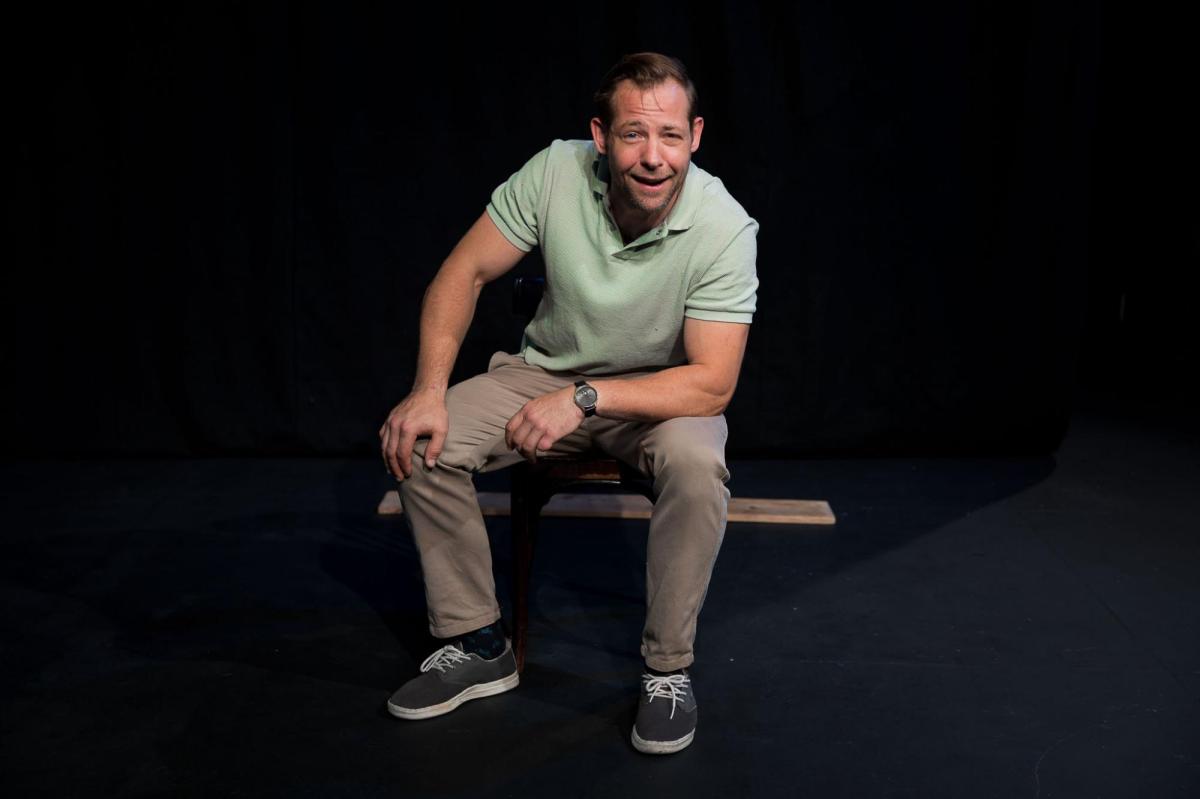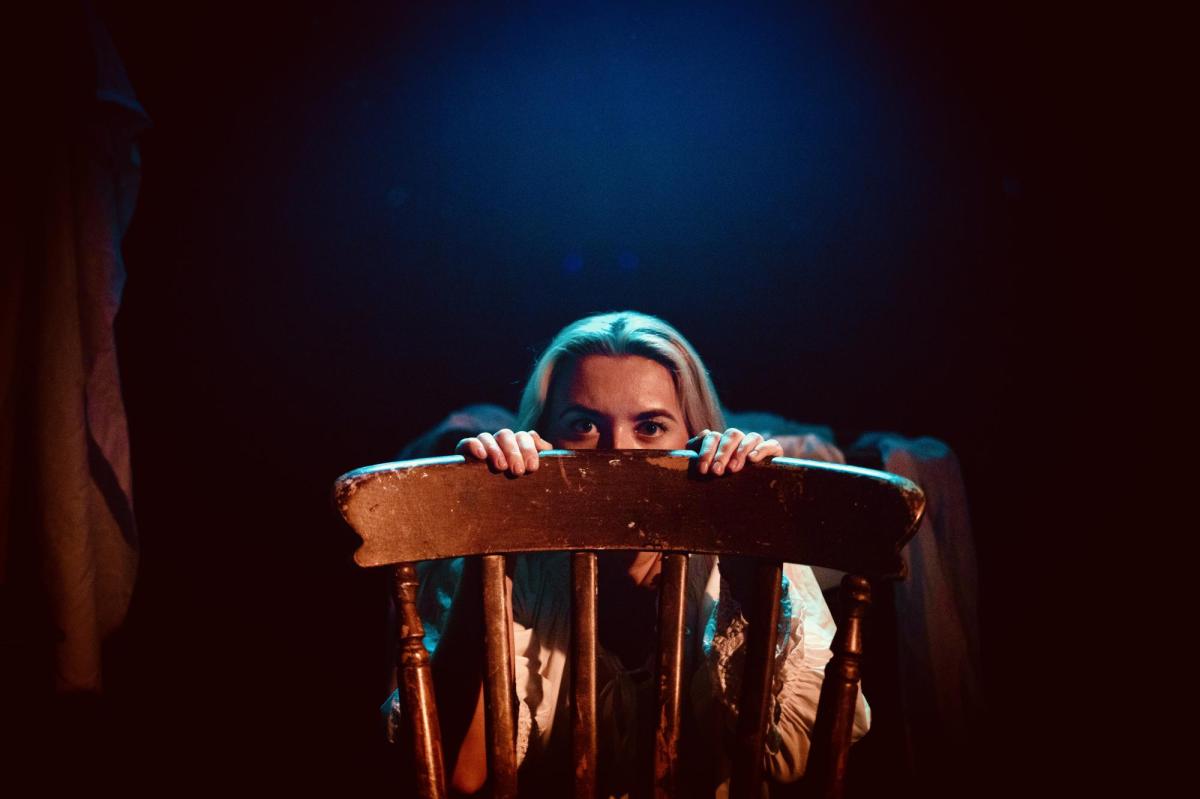Did You Mean to Fall Like That
★★★★
The Edinburgh Festival Fringe showcases a number of solo performances.
Did You Mean to Fall Like That is a one-man play written by award-winning playwright Stephanie Martin, performed by James McGregor and directed by Scottie Cross. It’s a sharply observed comedy about contemporary masculinity, bisexuality and interpersonal relationships.
The script is very well-crafted with a lot of warmth and humour. McGregor is excellent in the role of the immensely likeable Charlie, who’s just broken up with his wife and is going through a lot of upheaval. He reaches out on a group chat to a bunch of mates, ‘Anyone fancy a pint?’ The only one to respond is Oliver, a guy he met ages ago and didn’t actually intend to connect with, forgetting he was on the chat. However, Oliver’s available and because Charlie’s a nice guy he meets up with him and enjoys himself despite his reservations.
At the same time Charlie hooks up with ex-girlfriend, Fran, who’s now a single mum with two young kids. ‘How are you?’ Charlie asks when he meets the youngest, ‘Good, I just did a really big poo!’
Before hooking up with Fran, Charlie explains, ‘I wash my penis in the sink – it’s the polite thing to do.’ Charlie enjoys the sex, but he’s not into Fran as much as she’s into him and when she starts getting needy he has to move on. He’s also dealing with well-meaning but unhelpful advice from his sister, a colleague at work and a weirdo on a dating site.
There are loads of laughs and McGregor does a great job capturing the nuance and complexity of his character. He delivers the comedy in a subtle, nuanced way with impeccable timing. This was written as a one-hander, but I thought it could easily be developed into a play with multiple characters. Each character has a unique voice and while McGregor masters Charlie’s character, he could have done with a little more direction and differentiation with the others (apart from the dating weirdo – he nails her).

As Charlie turns to the various different people in his life for support, it is Oliver who proves the most helpful. He’s done a lot of therapy (‘You’ve got to learn to be in your adult Charlie, not your child’), is self-aware, insightful, emotionally available and a lot of fun. After they go for a hike Olly invites Charlie back to his place for a line of coke. Sparks fly and their friendship becomes physical, taking Charlie completely by surprise but, bless him, he rolls with it and has a lot of fun.
This beautifully crafted play is a wonderful exploration of sexual fluidity and the surprising twists and turns our lives can take. It’s funny and engaging with lots of warmth and charm.
Did You Mean to Fall Like That will be performed at Pleasance Courtyard Bunker Three until 25 August 2024.
The Daughters Of Róisín
★★★★ 1/2
The Daughters Of Róisín is written and performed by Irish born Aoibh Johnson and produced by Wee Yarn Productions. It’s the story of Johnson’s great-grandmother who became pregnant after having sex for the first time at 17, was locked in her room for the duration of her pregnancy and then had her baby stolen from her.
Johnson has crafted a beautiful non-linear narrative, which utilises poetry, song and poetic dialogue that riffs around the subject of her great-grandmother’s pregnancy. She wrote it while studying feminist protest at university and asked herself what she had to protest about. She was interested in using historical archives to create theatre. While exploring the family archives she came across the story of her great-grandmother’s “shameful” pregnancy and decided to use it. She wrote it because she doesn’t want people to forget the daughters of Érin (the Irish name for Ireland) and the abuses committed against women by the Catholic Church and State.
There’s no denying Johnson is a considerable talent. Her writing and performance are engaging, beautifully modulated and deeply passionate. Her singing and choice of songs are delightful and moving. Her decision to experiment with multiple forms in the play’s structure is admirable, because it shows that, as a writer, she’s willing to take risks with form and still be able to craft an accessible, well-made play. In The Daughters Of Róisín, she captures the essence of Ireland with its lyricism, love of music and the spoken word, while also having the courage to criticise the shame and judgement wrought upon innocent women by Church and State. Most importantly her heartfelt portrayal of her innocent great-grandmother is deeply moving.
The Daughters Of Róisín will be performed at Pleasance Courtyard, Bunker One until 25 August 2024.
Beyond Krapp
★★★ 1/2
One-man show Beyond Krapp is written and performed by Irish actor/playwright Peter McCormick. It’s inspired by the Samuel Beckett play Krapp’s Last Tape and explores similar themes: fear of failing in relationships, fear of not finding love and fear of death. (Though thankfully he doesn’t bang on about his constipation the way Beckett’s Krapp does.)
It’s a remarkably mature concept and script for a young writer/performer and caused me to reflect on the legacy of literary sophistication the Irish seem to carry in their DNA. The Daughters Of Róisín, also written and performed by a young Irish actor/writer, carries the same sophistication in concept and rich lyrical language as Beyond Krapp.
Beyond Krapp opens strongly with our protagonist sitting at an elegant table draped in an Italian tablecloth. He plays games with the audience by telling a story about a priest coming to his side and anointing his body with a sensual oil. It seems he’s alluding to an illicit moment until he reveals the truth.
We realise he is in fact sitting somewhere quite unexpected and trying to come to terms with the mistakes he has made in his life. McCormick has a lovely articulate physicality and immense charisma in the role. The witty lines come thick and fast and he immediately draws us in with his funny banter.
As the story develops, two significant figures emerge from his life – his mother and his old girlfriend. They both communicate with him through voiceovers. This is where the play begins to lose its power and momentum. The voiceovers are at first moving – his girlfriend’s voice is intimate, warm and interesting, but as the conflict develops and she berates him for failing her, the pace of the play slows down and the drama becomes somewhat diminished.
Read: Theatre review: The Weight of Shadow, Edinburgh Festival Fringe
We’ve lost the dynamism of McCormick’s performance and the charisma of his character as we focus in on the voiceovers. What they say is beautifully written, but without the presence of their bodies in the space to keep the action dynamic, the drama becomes diluted. The mother’s final speech is beautiful, but I wanted her to be embodied. I wanted to see the anguish on her face and be moved by her physical presence.
Because the final words in the script are hers and not those of the main protagonist, the play ends with a whimper rather than a bang. The voiceovers are not sufficiently powerful to carry the play to a satisfying conclusion. That being said, the script has enormous potential and could become something very special with a little more development.
Beyond Krapp will be performed at Pleasance Courtyard in the Cellar until 24 August 2024.





